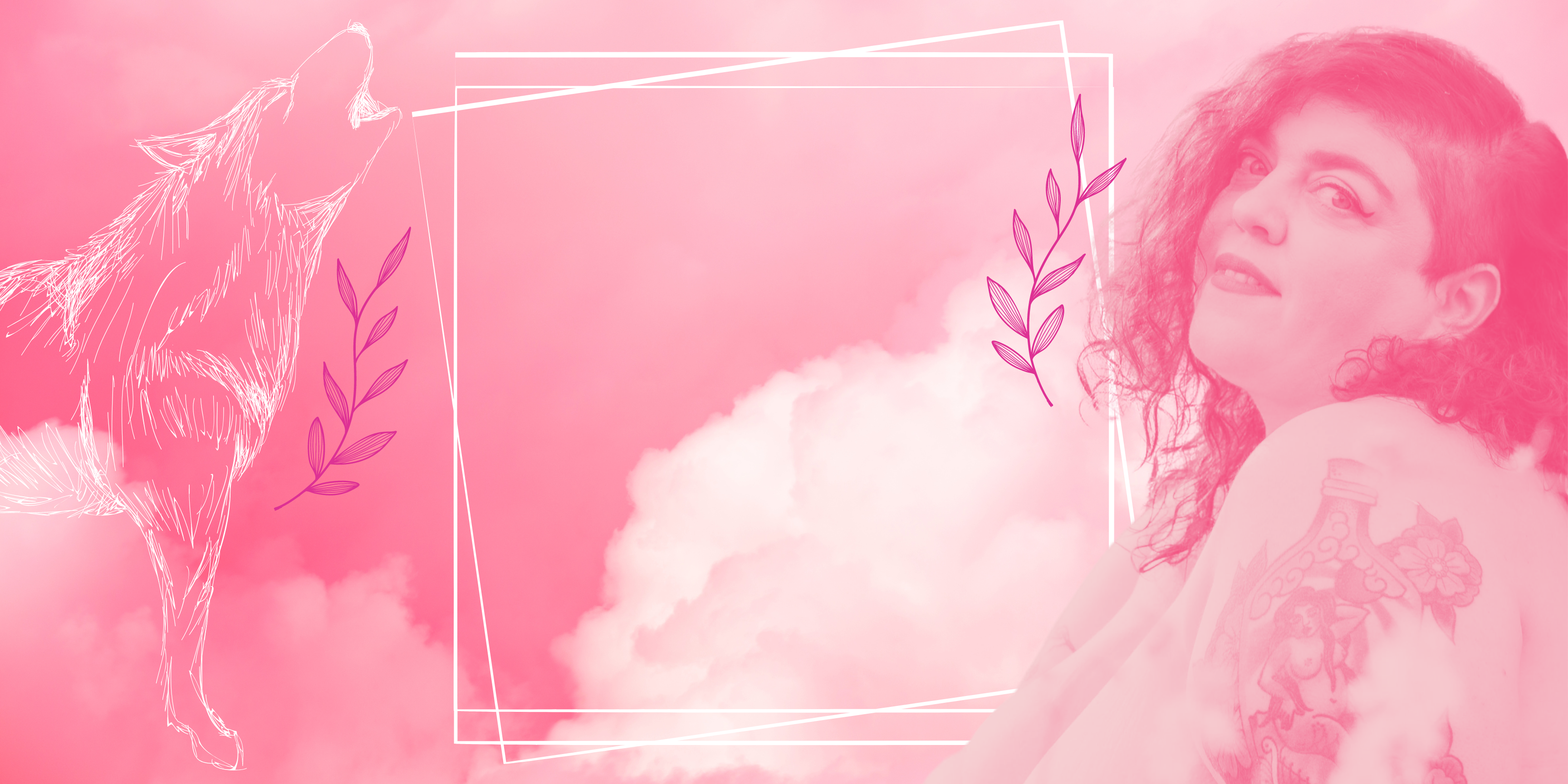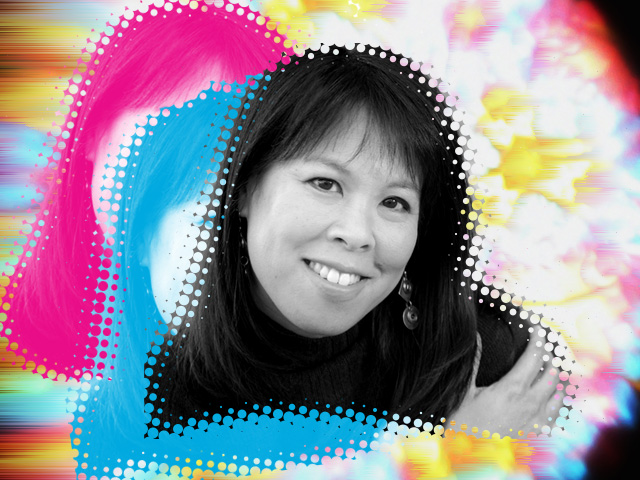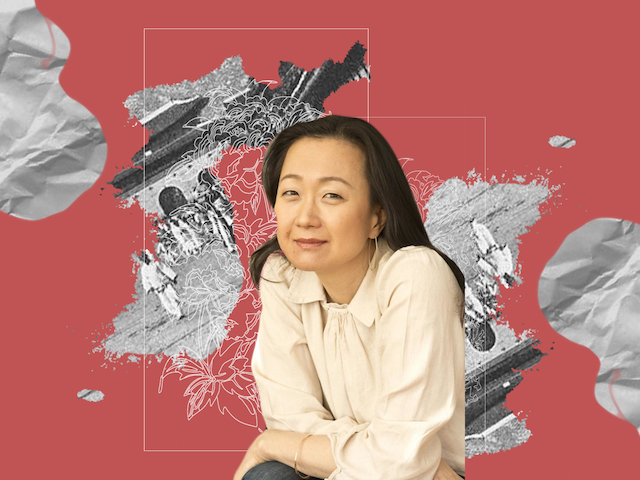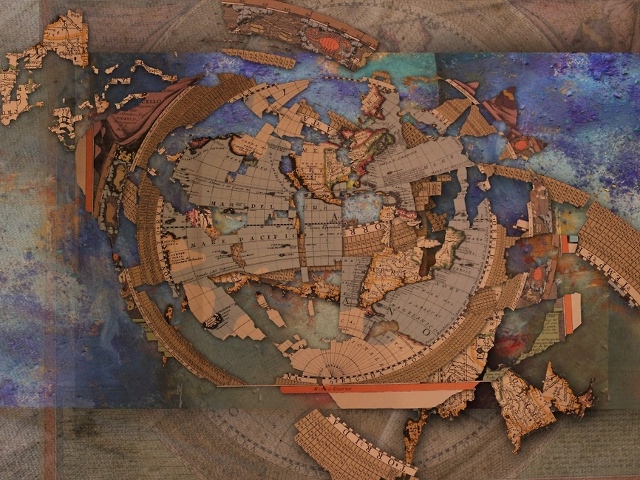A conversation with Randa Jarrar

June 15, 2023
Randa Jarrar’s meandering memoir, Love Is an Ex-Country, first published by Catapult in 2021 and now out in paperback, is an unconventional road trip book. It is neither chronological nor takes place fully in a car, true to how all travel usually is. Rather, it is a journey through Randa’s memories and an excavation of her attempts to find herself in an empire that has made no space for her. Randa’s book begins in the summer of 2016, when the rise of Islamophobia coincided with the 2016 presidential election. It was also a time of performative solidarity during which allies wore pro-Muslim safety pins and hugged Muslims holding signs. Randa’s narratives weave a deeper understanding of what it means to exist in a Muslim American body, and what can happen when we tell our stories that were never meant to be told.
Jarrar’s words are frank and deliberate. There is a popular trauma porn format of telling stories of Muslim oppression for the white gaze, found in even the most earnest Muslim American memoirs, but that doesn’t exist in Jarrar’s novel. Instead the words are bold and honest, telling you just enough without exploiting the Brown lived experience. She talks about domestic abuse, sexual exploration, fatness, her wrought family tensions—yet her story is complex and defiant of the classic Muslim tropes. No white woman will read this book and decide that they know everything about being a Muslim woman. Instead, this story is a call-and-response to an audience of those who are Muslim-ish like me.
I first met Randa’s work through her creative essays—my co-host for the podcast Good Muslim, Bad Muslim and I were so in awe of her May 2017 Buzzfeed article on being a “Bad Muslim” that we gave her that month’s Good Muslim Award on an episode of the podcast. After she moved to Los Angeles in 2018, we invited her on as a guest host on the show and became fast friends ever since. During the pandemic, our friendship morphed into that of quiet companionship—we spent hours sitting side by side co-writing and watercoloring while watching the sunset on her veranda. It was our way of reminding each other of our humanness in a lonely apocalyptic pandemic.
It was during these Friday co-creating sessions late in 2022 that Randa penned a new foreword and chapter for the paperback version of Love Is an Ex-Country, which came out in April 2023. The following interview was recorded while sitting on her veranda, which she recollects in the new foreword, mentioning the crows she befriended and the lush lemon tree we would make lemonade from. She has since been forced out of that house due to gentrification. This interview now is a reminder of the time before that loss, when we sat on the veranda overlooking East Los Angeles at sunset while the coyotes howled and sky was painted pink.
Taz Ahmed
When I finished listening to the whole audio book, I thought it was a different experience to hear you, the writer, pronounce your own words. How did you feel about the book when it finally came out?
Randa Jarrar
Yeah, it felt like a release. I know that it’s called a book release, but it felt like an actual physical release of so much pain and memory and experiences. I think when you’re continuously writing and editing them, they’re still with you. But then once the book comes out, these memories are for others, and they become less painful, they take up less space. So I just feel lighter. I’m relieved and I’m grateful.
TA
A lot of the interviews I read about this book framed it as a road trip book or a journey book. But when I was reading it, I didn’t feel that. I’ve been thinking about how similarly we lived—you lived in Kuwait, I lived in Saudi Arabia. I traveled around a lot as a kid. You traveled around a lot. I just think this is what it means to be nomadic children of engineers. It’s very Western to think of books as linear, a road trip versus this was just what it means to exist as a Brown person in America. It’s just this kind of disjointed thing.
RA
I love the idea of a cannon of work by nomadic children of engineers, brown children of engineers, and the nomadic nature of living with these people.
I wanted to frame the book as a road trip, but I didn’t want it to be a literal road trip. I wanted it to be this invitation for the reader to come sit with me and have me tell my stories under my rules. When you get in a car with someone, you can’t really touch their radio, you can’t tell them to use the wipers. So it was my way of trying to control my own narrative, finally. Even though I drive places, I also flew places and I got on boats. In the book, I wanted to show that I’m just constantly traveling and moving around and being disoriented. And in some ways, I love the way that the book trolls the idea of white road trips.
One of the first lines of the book until I decided to edit it out was something about how road trips are the sort of domain of cisgendered white men. Not just road trips themselves, but the stories written by them and about them. So I kind of wanted to do the anti road trip, but still have some of the road trip that I took in 2016, right before Trump was elected, because it was such a wild time to be in America and to see how people were functioning and how many people were doing work, organizing, canvassing, and trying to get people to not vote for this guy.
TA
You started the book in 2016 at a particular frightening height of Islamophobia in this country. The tenor of politics of this country has changed in so many mind-blowing ways since then. This book documented this very specifically frightening time when Islamophobia and hateful attacks were on the rise, and this existence of overall racialized tension against anything Brown and Muslim in America. I wanted to ask you how you felt about that.
RA
I feel like it’s been happening for so long that the last eight years are just part of that bigger giant gulf of Islamophobia and pain. In terms of Trump and the Muslim ban, which was one of the first things he did when he signed executive orders, we need to keep fighting. We should never stop. We should never relax. And it’s something I think that Black activists have been saying for decades and centuries. So I really hope we listen this time and keep fighting. And some people won’t. Some people want to leave, and I don’t blame them.
I was in my twenties when 9/11 happened, and even though that was definitely shocking, I was also thirteen during the Gulf War. I was also growing up during the time when Iran and Iraq were constantly bombing each other. Growing up like this has always been this very painful way of being. We’ve been taken advantage of and drained of our resources by the US and the UK. I don’t know if it’s ever going to end. I think that people who peddle hope are great, lovely, wonderful. But really what we should be doing is fighting and fighting our asses off.
TA
As a Muslim woman, I really appreciated how much you explore the Muslim woman with a body in this book. I think I always saw myself as being independent and rebellious because I was trying to break free from my home life. But you take it a step further and talk about how the Muslim woman’s body never belonged to her from the very beginning. I never connected those things before.
I love how you were able to consider how your body wasn’t yours or how you’re meant to feel like your body wasn’t yours. And then you take the readers through this really poignant sexual narrative, from the empowerment of sexual exploration through to all the violence your body experienced.
RJ
Thank you. That makes me so happy to hear that. Just that that clicked for you. There’s so much self-blame and so many obstacles that keep us from loving ourselves and understanding the ways that we were doomed from the beginning. It makes me very emotional to talk about it—it’s really sad.
In the book, I write how two days after I was born, the nurses wanted to do a bathing demonstration with me, and my parents were okay with it. It was okay for me to be naked in front of all these strangers. But pretty soon after that, I was not supposed to be. The older I got, the less skin I was supposed to show, and I never really connected that it was the gaze that was sexualizing, not my nudity. My nudity was just natural and normal, but others’ gaze was the problem.
And I had a really hard time writing all the moments of domestic violence and intimate partner violence in the book. It took me a really long time to write, and that’s okay. I started working on those chapters in 2012. It took me six years, really, to write probably a quarter of the book. It took me a while to realize it’s okay to just take my time to do this. And then once it was over, I had to do so many edits. I just kept taking breaks, making myself tea, and hugging myself and hugging my dog and praying and being thankful. And also reminding myself that the people who need to read it, that’s who it’s for. It wasn’t really for me to continuously torture myself. I was doing it because other people had to read it. So that helped me during that process.
And the sexuality. It’s really difficult to write about the body and not mention sexuality. I remember when my first book, A Map of Home, came out, and there were a lot of sexual moments and self-discovery in it. My father didn’t talk to me for seven years because he just didn’t think those parts were necessary. And that just mimicked the way that it was in my life, too. People don’t think that our pleasure is necessary, that our sexuality is necessary, that it’s something that we should be talking about. But there must be a reason why Allah gave us clitorises. It’s the only organ in any body that’s just for pleasure. Was that just a goof? I don’t think so. I’m going to write about the clitoris, and I’m going to write about pleasure because it’s my God-given right, literally. Once I started piecing all those things together, I got more and more excited about exploring them in nonfiction.
TA
In 2011, when Ayesha Mattu and Nura Maznavi’s anthology Love, InshAllah: The Secret Love Lives of American Muslim Women came out featuring love stories by twenty-five women—including my own essay “Punk Drunk Love”—we got such terrible backlash from the conservative American Muslim community. In the entire book, there was a little bit of sex, not even that much. But it was the simple act of Muslim women even voicing desire that caused discomfort and controversy. If that book came out now, I think it would be much more accepted. It’s so great that Muslim women writers who have been putting narratives out there like this have actually notably shifted the culture.
RJ
Absolutely, yeah. I think about Shirley Chisholm, and it makes me think: If you’re a person who is a catalyst in a culture or society, you’re going to take a lot of hits. People are going to push you. People are going to bully you. They’re not going to like what you’re doing. So you just have to be strong and say, this is working. If they’re pushing back, then it’s working.
But I think that we’re in a weird place as Muslim women because we’re constantly told, well, when you embrace your sexuality, you are allowing colonialism to happen. And it’s like, no, actually, if you look at our ancient texts, they are full of sex and sexuality.
Someone tweeted a photo of Taheyya Kariokka, the belly dancer that I love, kissing another woman on the lips in “greeting.” He just posted it and said, “In honor of Love Is an Ex-Country.” Three different Muslims were like, “This is not what that photo is. That photo is just a natural greeting. There’s nothing gay about it.” Nothing in the original post said anything about it being gay or queer. They’re telling on themselves. Why is it so threatening? Why is this a problem? I write for Muslims, but sometimes Muslims don’t want to read what I write.
TA
Well, there are plenty of us who do want to read what you’re writing. So people like me are the ones who you’re writing for, which I’m so grateful for. Do you have advice for young Muslim women writers?
RJ
Yes. I would say, try to be a good writer before being a good daughter or a good sister. I think that’s a big part of it. At different points you’ll find yourself feeling like you might have to choose between the two. You really actually don’t.
And as for the rules of writing, or getting better at writing, or any of that, it’s really true—you just have to sit down and do it. There’s no secret way. There’s no formula. If you ever are wondering, well, who’s going to read this, and is this important? Yes, yes. I will read it. It is important. Plenty of people want to read it and need it. You’re part of a larger tradition of women, and we love you, and we want you to come join us.
Find a mentor. Sometimes a mentor will find you, but sometimes you have to actually bother someone. I used to email Muslim writers constantly in my twenties and just be like, read this, be my mentor, take me to coffee, I know you have more money than I do. Give me advice. You’re asking for people to invest in you, and you’re worth it.
TA
I think that’s such a lovely note to end on. Well, thank you so much for inviting me to your stoop. I guess not stoop or patio. Veranda. Because we’re in Southern California, they’re all verandas out here.
RJ
VeRanda.
This interview has been edited and condensed for clarity.



